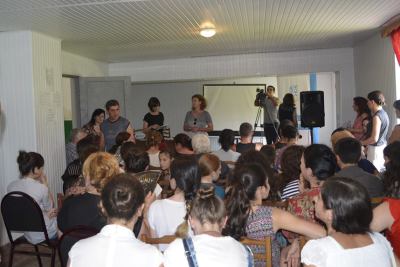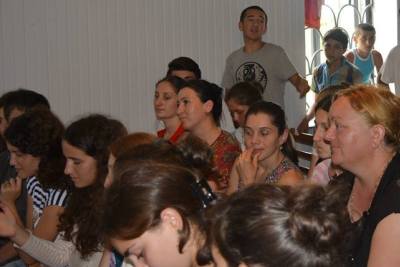Ergeta Village in Western Georgia Hosts Discussion on Ending Violence Against Women
Date:
Ergeta village, home to some 1,200 inhabitants, is located in Georgia’s Samegrelo region. Ergeta is a typical western Georgian village, where people welcome any opportunity to gather and discuss issues of common concern – especially with visitors and guests. On 6 July 2016, some fifty locals of all ages, including boys and girls in their teens, gathered at the municipality building to meet with UN Women and sportsmen from the Georgia Rugby Union to discuss the problem of violence against women and girls.

Ergeta Village in Western Georgia Hosts Discussion on Ending Violence Against Women; Photo: The NEFA Foundation
“It is no way our intention to scare you by showing this film,” assured UN Women Country Representative, Erika Kvapilova. “We just want to share with you real stories of women who have experienced violence by those who they should trust and rely on most. You may know some women or girls who are in a similar situation. We want to underline that we all can help to stop their suffering and prevent violation of the basic human right – the right to live a life free of violence.”
“When we witness violence, find out about it and do nothing, we practically become accomplices to the crime,” added Nodar Andguladze, UN Women’s Sports and Youth Specialist and former rugby player. “Our role, and the role of all of society, is key in such instances. Domestic violence concerns each and every one of us.”
The issues discussed in the meeting included the causes of domestic violence; its forms; Ergeta’s situation in this regard; how the community should respond to such acts; and what locals think is the solution to prevent and stop violence against women and girls.
As was the case in many of the other villages where UN Women and the Rugby Union held discussions about violence against women and girls, one of the key challenges identified in Ergeta was the acknowledgement of the problem itself. Several discussants confirmed that women do not speak about violence at all and that others are indifferent towards the issue. “Me too, I became a witness of violence, but unfortunately, I did not do anything about it,” one of the participants admitted. “I did not interfere. I thought, it was a family matter. There are many people like me out there. I now know it’s wrong.”
“Talk to your friends and acquaintances about this issue,” Merab Kvirikashvili, a prominent Georgian rugby player, urged the audience. “They may categorically disagree initially, but trust me, gradually they will understand the essence of the problem and realize that you are right, if you explain your point properly.”

Ergeta Village in Western Georgia Hosts Discussion on Ending Violence Against Women; Photo: The NEFA Foundation
Villagers further discussed early marriages, a still widespread practice, especially in rural areas. Some claimed that, because of violence in the family, girls sometimes seek a solution in getting married. However, they frequently end up in a similar or even worse situation themselves. The role and attitude of parents – who often do not support their children when they become victims of domestic violence and instead urge them not to “break” the family – was brought up in the discussion, especially by boys and girls.
Samegrelo is one of the most challenging regions when it comes to domestic violence. According to a 2014 UN Women study on the perceptions and awareness of violence against women and domestic violence in Tbilisi, Kakheti and Samegrelo-ZemoSvaneti regions of Georgia, 70.6% of the respondents in Samegrelo believed that domestic violence was widespread, while 25.5% feared that their relatives or friends could face this problem. However, only 54.4% thought that, in cases of domestic violence, a woman should divorce her husband. Tolerance of violence is very often acceptable to the population of Samegrelo.
To raise awareness of violence against women, its causes and its consequences, UN Women has been conducting meetings similar to the one in Ergetasince 2012 in different parts of Georgia, frequently with the support of its long-term partner, the Georgia Rugby Union. The discussions have been part of the UN Joint Programme for Gender Equality, funded by the Government of Sweden and linked to UNiTE, the UN Secretary-General’s global campaign to end violence against women and girls. The meetings in the regions are also an opportunity to provide information on the existing services for victims and survivors of domestic violence.